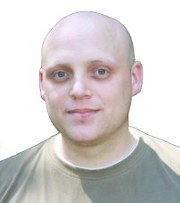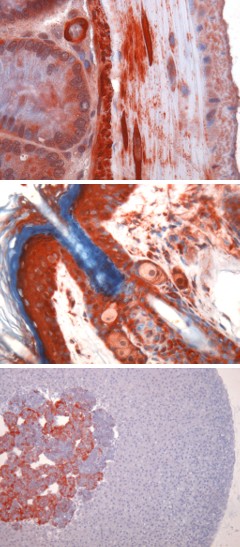|
||||
Here you will find informations on the "Redox Atlas of the Mouse" project, the background and intention of the project, the choice of proteins investigated, and the people behind the project. optimized for Mozilla Firefox at >= 1200x800 resolution |
About the project - introduction Many excellent studies have provided evidence for the importance of the Trx family proteins for human health. The majority of these studies addressed the function of single or few of the proteins in cellular and/or animal models of human physiology and disease. The complex network of interactions and the partial functional overlap between these proteins prompted us to initiate this systematic investigation. Our aim was to provide a point of reference for future studies using mice as models for human diseases involving oxidative stress and disrupted redox signaling. The results presented imply more specific functions and interactions between the proteins of this family than previously assumed. Why redox proteins? Redox control of protein function is increasingly recognized as a major regulatory mechanism in basically all physiological processes. The disruption of redox control, termed oxidative stress, was implied in numerous disease conditions, including the major causes of mortality in both developed and less developed countries, i.e. cardio- and cerebrovascular diseases, obstructive pulmonary diseases, infections, and cancer, as well as diseases that are major burdens to our health care systems including neurodegeneration and diabetes. About us Our main interest is to identify redox control circuits of medical relevance and how these are altered in different disease conditions including, for instance, diabetes mellitus, neurodegenrative disorders, cardiovascular disease, and cancer. The following questions are the basis for our work: (1) What are the targets of Grxs and Trxs and how are they regulated? (2) Could the molecular understanding of these redox control events facilitate the therapy of the conditions mentioned above? For more details, please see our webpage at: http://www.lillig.de If you are interested to cooperate or contribute, please contact us at: redoxatlas(at)lillig.de José R. Godoy Berthet  José R. Godoy Berthet was born in Traiguén, Chile, on the 16th February, 1976. 1994-2000 he studied Veterinary Medicine at the Catholic University of Temuco, Chile. After a short experience as clinical veterinarian during 2001 he went to Germany in 2002 where he started his scientific career. 2003-2007 he worked at the Institute for Pharmacology and Toxicology, Justus-Liebig-University of Giessen, obtaining his phD (Dr. med. vet.) on the 9th January, 2007. On May 2007 he joined the group of Christopher Horst Lillig at the Institute for Cytobiology and Cytopathology of the Philipps-University in Marburg, where he is currently working in the characterization of thioredoxin-fold family proteins and their role in health and disease. One part of his work can be seen on the Redox Atlas of the Mouse, which illustrates our systematical way to analyze the redox proteome.
José R. Godoy Berthet was born in Traiguén, Chile, on the 16th February, 1976. 1994-2000 he studied Veterinary Medicine at the Catholic University of Temuco, Chile. After a short experience as clinical veterinarian during 2001 he went to Germany in 2002 where he started his scientific career. 2003-2007 he worked at the Institute for Pharmacology and Toxicology, Justus-Liebig-University of Giessen, obtaining his phD (Dr. med. vet.) on the 9th January, 2007. On May 2007 he joined the group of Christopher Horst Lillig at the Institute for Cytobiology and Cytopathology of the Philipps-University in Marburg, where he is currently working in the characterization of thioredoxin-fold family proteins and their role in health and disease. One part of his work can be seen on the Redox Atlas of the Mouse, which illustrates our systematical way to analyze the redox proteome.Contact: godoyber(at)staff.uni-marburg.de jrgodbert(at)hotmail.de Christopher Horst Lillig  Christopher Horst Lillig was born in Berlin, Germany, in 1972. He gained a Diploma in Biology (1998), specialized on Biochemistry and Biophysics, and a Doctor of Natural Sciences (Dr. rer. nat., 2001) from the Ruhr-Universität Bochum in Germany. In 2001, he joined the Medical Nobel Institute for Biochemistry, Karolinska Institutet, Stockholm, Sweden, as postdoctoral fellow under the guidance of Arne Holmgren, well known for his pioneering studies on the thioredoxin family of proteins. Among other achievements, Dr. Lillig discovered the first iron-sulfur cluster containing member of this protein family. Dr. Lillig returned to Germany in 2006, when he was awarded an Emmy-Noether Group Leader Fellowship/Grant in the Collaborative Research Centre 593 by the German Science Foundation (DFG). In 2010 Dr. Lillig gained his venia legendi (Habilitation) in the fields of Biochemistry and Cell Biology. Today, the research focus of the Lillig group lies on the identification and characterization of redox-dependent signaling pathways and their role in health and disease.
Christopher Horst Lillig was born in Berlin, Germany, in 1972. He gained a Diploma in Biology (1998), specialized on Biochemistry and Biophysics, and a Doctor of Natural Sciences (Dr. rer. nat., 2001) from the Ruhr-Universität Bochum in Germany. In 2001, he joined the Medical Nobel Institute for Biochemistry, Karolinska Institutet, Stockholm, Sweden, as postdoctoral fellow under the guidance of Arne Holmgren, well known for his pioneering studies on the thioredoxin family of proteins. Among other achievements, Dr. Lillig discovered the first iron-sulfur cluster containing member of this protein family. Dr. Lillig returned to Germany in 2006, when he was awarded an Emmy-Noether Group Leader Fellowship/Grant in the Collaborative Research Centre 593 by the German Science Foundation (DFG). In 2010 Dr. Lillig gained his venia legendi (Habilitation) in the fields of Biochemistry and Cell Biology. Today, the research focus of the Lillig group lies on the identification and characterization of redox-dependent signaling pathways and their role in health and disease.Contact: horst(at)lillig.de lillig(at)staff-uni-marburg.de |
 |
||